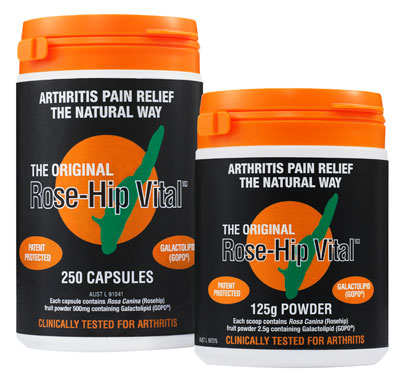Arthritis Rose-Hip Vital

Arthritis Rose-Hip Vital
Rosehip is quickly taking the mantle as a leader in the Complementary Therapy sector, as the discussion about claims rages on and legislators, consumers and manufacturers debate the issue of claims relating to Complementary Therapies.
Marking the commencement of Arthritis Week 2012, the call for tighter control about claims is reaching a crescendo.
One Complementary Therapy is Rosehip, which has risen to the fore as a standout therapy, supported by a significant body of scientific evidence.
According to Prof Marc Cohen, Professor of Complementary Medicine at RMIT University, the substantial weight of research behind Rosehip is helping to convince doctors that it may be effective as a first-line therapy for people suffering the symptoms of Arthritis.
"While there are many unsubstantiated claims in the marketplace, Rosehip is backed by more than 30 scientific studies including 4 double blind placebo controlled trials, over the last decade," Prof Cohen said.
"These studies suggest that Rosehip may be an effective first-line therapy for osteoarthritis sufferers."
"In particular, the studies have found the anti-inflammatory power of Rosehip is reported to have similar effects to indomethacin - a prescribed non-steroidal anti-inflammatory drug (NSAID).
"The anti-inflammatory properties of standardised Rosehip may make it a viable replacement or supplement for conventional drug therapies in inflammatory diseases such as Arthritis.
"Rosehip has been found to significantly reduce inflammation and pain for people with osteoarthritis.
Prof Cohen said Rosehip's anti-inflammatory action has been attributed to high quantities of galactolipids, a class of compounds which have shown anti-inflammatory activity in various studies.
"A particular galactolipid unique to the patented powder Rose-Hip Vital, named GOPO®, has been shown to be responsible for the clinically observed anti-inflammatory properties of standardized rose hip powder.
Prof Cohen said the studies found Rosehip has no known side-effects and may be used alongside conventional treatments as well as potentially replacing or reducing the reliance on anti-inflammatory and other pain medication.
"Research shows rosehip doesn't have the potential side effects of non-steroidal anti-inflammatory drugs and aspirin and is suitable for people at increased risk from the gastrointestinal or cardiovascular side effects of NSAID.
The Rosehip Studies - What the Research Says:
Reduced pain scores after three months. Patients who took rosehip were twice as likely to have reduced pain scores than people who took sugar pills.
Six other studies also found rosehip powder had a moderate effect in patients with osteoarthritis.
Rosehip reduced pain in 64.6% of patients with hip or knee osteoarthritis. People who took rosehip also experienced improve hip flexion.
Significant reductions in pain for 66% of patients in yet another study. This study found the majority of patients had reduced pain, reduced consumption of pain medication and a small but significant reduction in total cholesterol. Patients in this study also experienced significant improvements in mood, wellbeing and sleep quality.
Another trial on patients with osteoarthritis of the hip or knee found treatment with rosehip resulted in a significant reduction in pain and use of medication' after just 3 weeks. Patients also had a significant reduction in disability, stiffness, and severity of the disease after 3 months of treatment.
Helping to temporarily relieve the pain of Arthritis, for Rheumatism and Osteoarthritis, the unique property of Rose-Hip Vital™ is the special patented active compound, Galactolipid (GOPO® - glycoside of mono and diglycerol) isolated from the rosehip, Rosa Canina L. which acts as a natural anti-inflammatory. Significant levels of Galactolipid (GOPO®) can only be obtained if the Rosehip is dried using a special patented process.
Available in Capsules and a new easy-to-take 125g Powder, Rose-Hip Vital™ is the only product that contains the patented GOPO® compound and may help:
Temporarily relieve the pain of Arthritis, Osteoarthritis and Rheumatism
Increase joint mobility
Relieve inflammation and joint swelling
Improve Osteoarthritis symptoms in the hands
Improve sleep when affected by joint discomfort
Improve the symptoms of lower back pain
Rose-Hip Vital™ is a powerful antioxidant made from 100% natural Rosehip (Rosa Canina) which may help temporarily relieve the pain of Arthritis, Rheumatism and Osteoarthritis. Rose-Hip Vital may help relieve symptoms of osteoarthritis such as inflammation and joint swelling and increase joint mobility. Using Rose-Hip Vital capsules may even improve sleep by helping relieve joint discomfort. Rose-Hip Vital Pty Ltd is the only company in Australia that has our products tested for the patented compound GOPO®.
www.rosehipvital.com.auTel 1800 851 888
MORE
- Best Snacks For Brain Health
- Antoinette-Louise Barnardo Swisse Kids Health...
- How to Eat Healthy
- 5 Natural Energy-Boosting Habits
- Dr. Ross Walker How Food Can Help With Heart...
- Top 5 Nutrient Boost Tips
- 10 Brain Foods Everyone Should be Eating
- Lee Holmes 2017 Health Trends Interview
- PureBred Seven Day Gluten-Free Challenge
- Study Suggests Poor Quality Diet Linked To...
- I Quit Sugar for Life
- Mad For Health 8 Food Myths
- Never Be Tempted Out Of Your Gluten-Free Diet...
- Melanie McGrice AIA Healthier Habits in 2014...
- Natural Remedies The Latest Buzz For Bites You
- Bosisto's Lavender Packs
- Chillax Natural Sleep Drink
- Beaming with Health Nighty Night
- Blackmores Eco-Krill
- Pamela Hore Bring It To The Table Interview
- Professor Kerin O'Dea Intervention on...



